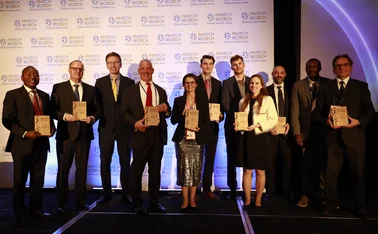
Lifetime achievement award: Zeti Akhtar Aziz
Policies introduced during Asian financial crisis helped Malaysia weather 2008 global meltdown

On the morning of May 10, 1999, Zeti Akhtar Aziz, deputy governor of Bank Negara Malaysia, boarded a plane at the Kuala Lumpur International Airport, bound for New York. The airport, a gleaming glass-and-steel structure boasting the world's tallest control tower and an indoor jungle, had been green-lighted during the boom years of the early nineties, after Malaysia's government decided the old airport was too small to handle future demand. The airport was inaugurated in 1998, when the Asian financial crisis caused the Malaysian economy to contract by 7.4%.
Zeti was heading to New York on a mission; in the US she would end up holding 26 meetings in 10 days as part of a worldwide roadshow to market a government bond. It was a gutsy and bold move at a time when South-east Asia was still reeling from one of the worst financial collapses in years. As she wrapped up the tour, Zeti later recalled, "the market had turned negative on the back of developments in Latin America and the Federal Reserve had just announced a bias towards tightening". The Malaysian government decided to press ahead and the bond was oversubscribed three and a half times. "[It] was a turning point for us," Zeti told Central Banking in 2009. It was also a telling move.
The Asian financial crisis has been described as a 'perfect storm', prompted and prolonged by the confluence of rigid exchange rates, current account deficits and foreign currency loans. Triggered by a forced devaluation of the Thai baht on July 2, 1997, it spread to Malaysia within days. By early August, speculation against the ringgit had pushed money market rates up by 32.5 percentage points to 40%. In the months after, the stock market and the currency lost half their value. In Indonesia, the worst-hit country, money market rates peaked at 65% and the rupiah lost 85% of its value against the US dollar, causing food shortages and bursts of ethnic violence.
 Zeti addresses the 3rd Global Islamic Finance Forum in 2012
Zeti addresses the 3rd Global Islamic Finance Forum in 2012
Unlike its neighbours, Malaysia did not turn to the International Monetary Fund (IMF) for help. Instead, prime minister Mahathir Mohamad dismissed fund policies, lashing out at "unproductive and immoral" currency trading. He also proclaimed hedge fund investor George Soros a "moron". The two started trading insults via the media. Soros, who blasted Mahathir as a "loose cannon" and a "menace to his own country", dismissed the PM's implied currency trading ban as "such an inappropriate idea that it doesn't deserve serious consideration".
Zeti was appointed acting governor of Bank Negara on August 31, 1998, following a bust-up between Mahathir and her predecessor, Ahmad Mohd Don. At the time, she was unknown to the foreign press. The New York Times referred to her as 'Mr Zeti'. The Wall Street Journal described her as a "strong proponent of the policies advocated by her predecessor" but "regarded as [less] forceful". A day later, after more than a year of market turmoil and currency fluctuations, Bank Negara imposed capital controls, froze repatriation of foreign portfolio capital for a year and ordered the return of all offshore ringgit within a month. The central bank pegged the ringgit to the US dollar and immediately cut interest rates.
It was IMF policy in reverse. To some it bordered on heresy. "Malaysia has thrown away the lessons of the past half-century," wrote Steve Hanke, a professor at Johns Hopkins University, in an article for Forbes magazine, citing Friedrich Hayek's characterisation of exchange controls as a "decisive advance on the path to totalitarianism and ... the final suppression of all means of escape". The new acting governor took a more pragmatic position. "We want to prevent a meltdown," Zeti said.
A road less travelled
The Bank Negara governor's office sits atop one of the central bank's two high-rise buildings in downtown Kuala Lumpur. Airy and tranquil, it is a world apart from the bustling streets below. When Central Banking stops by, Zeti has just delivered a monetary policy decision and fielded questions from reporters in a conference room downstairs.
The ringgit slipped to its lowest level since the Asian crisis in 2015, and Malaysia was rocked by a corruption scandal that at one point looked like it might spell the political downfall of the country's prime minister.
At age 68, Zeti has an air of regal elegance about her yet is disarmingly unassuming. She speaks softly but ardently and with candour. The Asian crisis "turned out to be a bit of a blessing in disguise", she says. "It [showed] we were resilient [in 2008], which I think is a testimony to good governance," she said.
Zeti was born on August 27, 1947, in Johor Bahru, across the strait from Singapore. The town served as garrison for Japanese forces during their attacks on the British in 1945. Her parents, Ungku Abdul Aziz, a one-time vice-chancellor of the University of Malaya, and Sharifah Azah Aziz, a journalist, were public figures; Zeti has described them as a "tremendous inspiration", at times "highly controversial for their ideas and opinions".
At 27, she enrolled in the PhD programme at the University of Pennsylvania's Wharton School. Her dissertation was well-received, but she felt the confines of academia too narrow. "I knew that I wanted to be a policy-maker," Zeti told the Wharton Magazine in 2013. In March 2015, she received the Wharton Dean's Medal, the school's highest accolade, for her "tremendous economic impact" on Asia and beyond. A press release described Zeti as "an incredible policy maker, central banker, and person" of "amazing accomplishments".
Returning to Kuala Lumpur in 1979, she secured a job as an analyst at the South-East Asian Central Bank Research and Training Centre (Seacan) after making an impression on the Bank Negara governor, Tun Ismail bin Mohamed Ali, at an art exhibition. After completing two volumes on regional interest rate reform, she eventually joined Bank Negara's economics department as a deputy manager in 1985.
 Acting governor Zeti announces new domestic forex controls in 1998
Acting governor Zeti announces new domestic forex controls in 1998
Coming of age
Zeti was appointed governor of Bank Negara Malaysia on May 1, 2000, after a brief stint as acting governor and 15 months as deputy governor under Seri Ali Abul Hassan bin Sulaiman. The first woman in Asia to chair a central bank, she told the Wharton Magazine in 2013 she had "never confronted ... gender-related challenges" professionally. Instead, she pointed to a different chasm, noting how "it is always tough for a central bank from an emerging economy to deviate from the conventional" views espoused by powerful peers.
After Bank Negara's intervention in 1998, Malaysia's economy bounced back quickly. The central bank began lifting some capital controls after six months. It raised banks' capital requirements in absolute terms, forcing many institutions to merge to stay afloat. Bad assets were carved out and put under official management and several boards and chief executives were replaced. In 2001, Bank Negara announced a 10-year plan to strengthen Malaysia's financial sector and reduce the real economy's dependency on banks for financing. Bond and money markets were developed, helping institutions improve liquidity management, and gradually opened up to foreigners. Today, Malaysia's bond market is the biggest in South-east Asia.
The central bank also stepped up oversight of the financial system. It set up a credit reference information system to allow banks to manage their risk and a credit guarantee facility providing credit ratings for small businesses. "We changed everything," Zeti says. "You don't just achieve [financial stability] through regulation. You have to look at the institutional development." The reforms allowed Bank Negara to adopt a floating exchange rate regime in 2005, six years after pegging the ringgit to the US dollar. The financial reforms also braced Malaysia for the 2008 financial crisis, from which the country emerged virtually unscathed. "Probably the main lesson" of the global financial crisis, Zeti said at the central bank's fiftieth anniversary celebration in 2009, was "the resilience of our banking system and our regulatory and supervisory oversight".
Others were impressed too. A decade after having been castigated as the Asian crisis enfant terrible, "strong and inspired leadership", former Hong Kong Monetary Authority chief executive Joseph Yam observed at the same event, had "turned Bank Negara Malaysia into a first-rate central bank and a great force for good in the region". Joseph Stiglitz, the Nobel prize-winning US economist, meanwhile, called the central bank "a prime example of a good institution and one from which the entire world can learn a great deal". Zeti "is one of the most influential central bank governors in Asia over the last 25 years", says Ravi Menon, managing director of the Monetary Authority of Singapore. "[Her] record in office speaks for itself."
Making her mark
A central part of Bank Negara Malaysia's reform agenda has been the development of Islamic finance. Here too, Zeti has played a unique role. In 2002, she led a team that paved the way for the first-ever issuance of a sovereign sukuk. She chaired the Inauguration Committee for the establishment of the Islamic Financial Services Board (IFSB), the Kuala Lumpur-based entity widely regarded as the standard-setter for Islamic finance regulation and supervision, and helped set up the International Islamic Liquidity Management Corporation.
 Zeti talks to the press after Malaysia unpegged the ringgit from the US dollar
Zeti talks to the press after Malaysia unpegged the ringgit from the US dollar
Zeti was also instrumental in the establishment of the International Centre for Education in Islamic Finance (Inceif), the first global university dedicated to Islamic finance. In 2012, she was awarded the Islamic Development Bank's Islamic Banking and Finance award, and in 2015 she was given a lifetime achievement award for her work by Dubai's ruler, Mohammed bin Rashid Al-Maktoum.
Zeti has also played a major role in promoting financial inclusion, another key part of the central bank's role in the development of the finance industry. Bank Negara has developed an index of financial inclusion to measure the effectiveness of formal financial institutions in delivering financial products and services to all members of society. This tracks the progress of initiatives and estimates the impact of policies to further deepen the reach of the financial sector, and is part of an effort to ensure Malaysia can reach its goal of becoming a high-income country by 2020.
When foreign banks sought to set up branches in one of the big cities, for instance, the central bank allowed them to do so only if branches were also opened in rural and semi-rural areas. "We want balanced growth, as it promotes social and political stability when income disparity is narrowed," Zeti noted in 2009. "We think it's very important that future generations of central bankers in our country will always pay heed to that."
Zeti has participated extensively in international forums. She was a member of the Commission of Experts of the President of the United Nations General Assembly on Reforms of the International Monetary and Financial System in 2009, a high-level task force established to examine reforms in the global and financial system. She is currently chair of the Bank for International Settlements (BIS) Central Bank Governance Group, of which she has been a member since 2001.
Zeti has been actively involved in strengthening regional financial integration. In 2006, she chaired the executives' meeting of the East Asia-Pacific Central Banks task force that prepared the report for the future direction of central bank financial co-operation in the region. A founding member of the BIS Asian Consultative Council, she was also the first co-chair of the Financial Stability Board Regional Consultative Group for Asia. "Zeti has led efforts in Asean financial integration and capacity building, and helped develop Malaysia as a pre-eminent centre for Islamic finance," says Menon.
"I'm very pro-Asia," Zeti says. "I have been making more speeches on Asia than Malaysia since 1996." Last year, Bank Negara announced the establishment of the world's first central bank business school, in collaboration with the Massachusetts Institute of Technology (MIT). The Asia School of Business (ASB) will commence classes in September, with an initial batch of 25-30 students both staying and studying at the central bank while the new campus is being built next door. "[It] is going to be a first," says Zeti, who will serve as the school's co-chair. The hope, she adds, is that students will be "absorbed by companies all over Asia" and that the school will serve a broader purpose by "enhancing the understanding" of the region in other parts of the world.
Leadership and legacy
After 30 years at Bank Negara, and more than 15 as governor, Zeti has a clear idea of the broad role she believes the central bank must play to ensure the economy runs smoothly and financial stability is maintained. The Asian financial crisis cemented her belief that monetary authorities are ideally placed to deal with ongoing crises, but that they should play a major role in preventing them from emerging, too. "If you provide the supervisory oversight and you are doing the stress tests [of banks' balance sheets], then you are the one who knows whether any financial stress is a liquidity problem or a solvency problem," she says. "The central bank should be the one who calls the shots with regards to financial stability, because it has the expertise and the information to do so."
Proponents of retaining regulatory powers with the government invoke democratic accountability and oversight as the principal justification for doing so. Those in favour of having central regulatory powers reside with the central bank, like Zeti, instead resort to a utilitarian logic: monetary authorities are usually best equipped to maintain stability. "There should be checks and balances for transparency and clarity in the decision-making process so the central bank can never abuse its power," she says. "But you can have arrangements whereby if you have great clarity in the mandate of financial stability, [it works]."
That approach was enshrined in Malaysia's Central Banking Act, passed in 2009, which outlines Bank Negara's "principal" objectives of promoting "monetary stability and financial stability conducive to the sustainable growth" of the Malaysian economy. "The Central Banking Act was a major breakthrough," Zeti says. "We had discussions every week for about two years on different issues" before it was adopted. "We were, I think, the first central bank to legislate the definition of financial stability." The Act, with its reference to "sustainable growth", also gives Bank Negara the freedom to interpret its price stability mandate more broadly. "We're not going to run the economy into the ground just to have low inflation," Zeti says. "What would be the point?"
Vindication
In March, 2014, nearly 16 years after she helped engineer a controversial break with IMF orthodoxy, Zeti was invited to give the Per Jacobsson Lecture, named after the former IMF managing director, at the BIS in Basel. Her topic of choice was financial crisis management. While Bank Negara's actions during the Asian crisis stopped being controversial long ago, it was, in many ways, a final vindication.
Zeti's "views on what central banks should do to avoid crises and most importantly, to deal with crises when they arise have been very influential", BIS general manager Jamie Caruana noted in his introductory statement, before driving the point home: "Over many years, you have never been afraid to challenge conventional thinking, and your views have often been vindicated."
"At first, I declined it," Zeti says in her office. "I didn't feel that I was in that league, you know." She describes the preparations as a process of "blood, sweat and tears", adding, "I had my job to do and at the same time [I had] to do that". Still, she found the experience of writing rewarding. "When I step down," in April, Zeti says, "my thinking is to take time off and do quite a bit of writing. "I don't think I want to ... take on a position. I will be my own person. I haven't been for a long, long time."
The Central Banking awards were written by Christopher Jeffery, Tristan Carlyle, Daniel Hinge, Arvid Ahlund, Dan Hardie and Rachael King.
Only users who have a paid subscription or are part of a corporate subscription are able to print or copy content.
To access these options, along with all other subscription benefits, please contact info@centralbanking.com or view our subscription options here: http://subscriptions.centralbanking.com/subscribe
You are currently unable to print this content. Please contact info@centralbanking.com to find out more.
You are currently unable to copy this content. Please contact info@centralbanking.com to find out more.
Copyright Infopro Digital Limited. All rights reserved.
As outlined in our terms and conditions, https://www.infopro-digital.com/terms-and-conditions/subscriptions/ (point 2.4), printing is limited to a single copy.
If you would like to purchase additional rights please email info@centralbanking.com
Copyright Infopro Digital Limited. All rights reserved.
You may share this content using our article tools. As outlined in our terms and conditions, https://www.infopro-digital.com/terms-and-conditions/subscriptions/ (clause 2.4), an Authorised User may only make one copy of the materials for their own personal use. You must also comply with the restrictions in clause 2.5.
If you would like to purchase additional rights please email info@centralbanking.com







